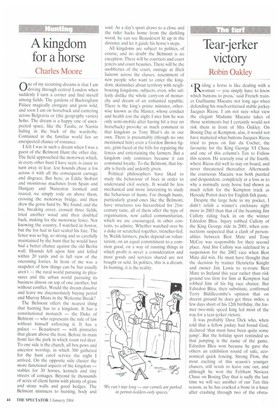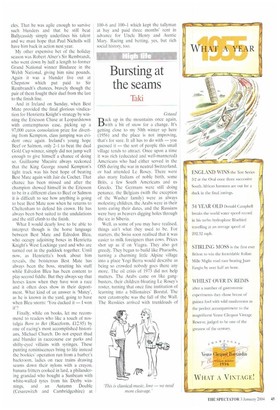Tear-jerker victory
Robin Oakley
CD iding a horse is like dealing with a ..[Xwoman — you simply have to know which buttons to press,' said French trainer Guillaume Macaire not long ago when defending his much-criticised stable jockey Jacques Ricou. I am not sure what view the elegant Madame Macaire takes of those sentiments but I certainly would not risk them in front of Mrs Oakley. On Boxing Day at Kempton, alas, it would not have mattered what buttons Jacques Ricou tried to press on Jair du Cochet, the favourite for the King George VI Chase and one of this column's Ten to Follow this season. He scarcely rose at the fourth, where Ricou did well to stay on board, and never threatened thereafter. Afterwards the courteous Macaire was both puzzled and despondent, completely at a loss as to why a normally zesty horse had shown as much relish for the Kempton track as Hercule Poirot does for English fish paste.
Despite the large hole in my pocket, I didn't relish a winner's enclosure sight more in 2003 than that of the beaming Jim Culloty riding back in on the winner Edredon Bleu. Injury robbed Culloty of the King George ride in 2001, when connections suspected that a clash of personalities between Best Mate and Tony McCoy was responsible for their second place. And Jim Culloty was sidelined by a suspension for the 2002 race when Best Mate did win. He must have thought that the decision by trainer Henrietta Knight and owner Jim Lewis to re-route Best Mate to Ireland this year rather than risk ground too firm for him at Kempton had robbed him of his big race chance. But Edredon Bleu, their substitute, confirmed Terry Biddlecombe's opinion that on decent ground he does get three miles; a few days short of his 12th birthday, the former two-mile speed king led most of the way for a tear-jerker victory.
It was probably Dave Dick who, when told that a fellow jockey had found God, declared 'that must have been quite some jump'. But the holiday sport reminded us that jumping is the name of the game. Edredon Bleu won because he gave the others an exhibition round of safe, economical quick fencing. Strong Flow, the most exciting of this season's younger chasers, still tends to leave one out, and although he won the Feltham Novices Chase on Boxing Day that is sadly the last time we will see another of our Ten this season, as he has cracked a bone in a knee after crashing through two of the obsta cies. That he was agile enough to survive such blunders and that he still beat Ballycassidy simply underlines his talent and we must hope that Paul Nicholls will have him back in action next year.
My other expensive bet of the holiday season was Robert Alner's Sir Rembrandt, who went down by half a length to former Grand National winner Bindaree in the Welsh National, giving him nine pounds.
Again it was a blunder five out at Chepstow which put paid to Sir Rembrandt's chances, bravely though the pair of them fought their duel from the last to the finish line.
And in Ireland on Sunday, when Best Mate provided the final glorious vindica tion for Henrietta Knight's strategy by winning the Ericsson Chase at Leopardstown with contemptuous ease, picking up a 97,000 euros consolation prize for diverting from Kempton, class jumping was evident once again. Ireland's young hope Beef or Salmon. only 2-1 to beat the dual Gold Cup winner, simply did not jump well enough to give himself a chance of doing so. Guillaume Macaire always reckoned that the King George round Kempton's tight track was his best hope of beating Best Mate again with „lair du Cochet. That chance has been missed and after the champion showed himself in the Ericsson to be in a different class to Beef or Salmon it is difficult to see how anything is going to beat Best Mate now when he returns to Cheltenham to defend his crown. He has always been best suited to the undulations and the stiff climb to the finish.
What I would dearly love to be able to interpret though is the horse language between Best Mate and Edredon Bleu, who occupy adjoining boxes in Henrietta Knight's West Lockinge yard and who are turned Out in the paddock together. Until now, as Henrietta's book about him reveals, the boisterous Best Mate has always been the boss, strutting his stuff while Edredon Bleu has been content to play second fiddle. But they always say that horses know when they have won a race and it often does show in their deportment. What kind of an answer is 'Matey', as he is known in the yard, going to have when Bleu snorts: 'You ducked it — I won it'?
Finally, while on books, let me recommend to readers who like a touch of nostalgia Rom to Bet (Raceform, £12.95) by one of racing's most accomplished historians, Michael Church. Do not expect thud and blunder in racecourse car parks and shifty-eyed villains with syringes. These punting reminiscences bring to life instead the bookies' operation run from a barber's backroom, ladies on race trains drawing seams down their nylons with a crayon, banana fritters cooked in lard, a philandering grandad who bought a Sunbeam with white-walled tyres from his Derby winnings, and an Autumn Double (Cesarewitch and Cambridgeshire) at 100-6 and 100-1 which kept the tallyman at bay and paid three months' rent in advance for Uncle Henry and Auntie Mary. Racing and betting, yes, but rich social history, too.



























































 Previous page
Previous page